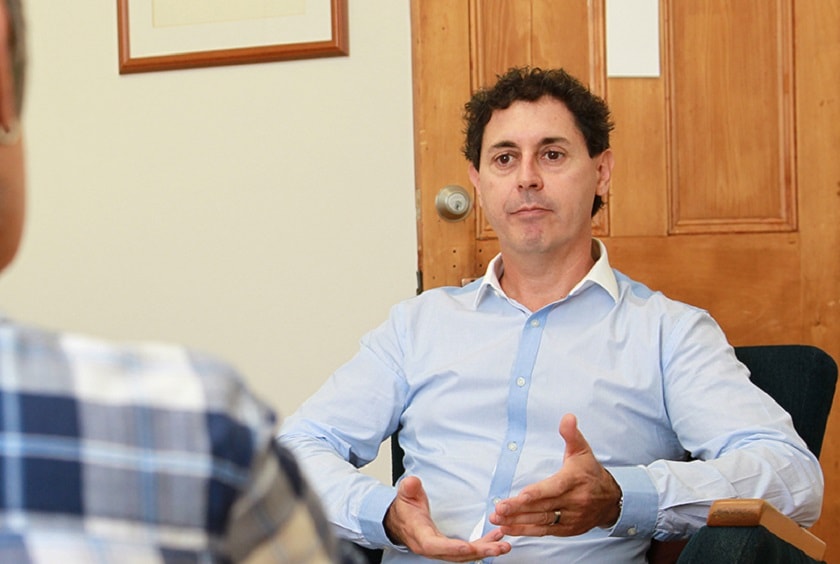It’s important to note that Horizon House is not just an accommodation service. It’s actually an intervention program housed within an accommodation service. We aim to address the immediate vulnerabilities that come with being homeless, and then to develop the capability and resilience of the young person so they don’t experience homelessness again in the future. We do this through a three-stage intervention process.
Stage one
The first stage is our Tier 1 program. This is our supported housing program and is probably what most people think of when they think about Horizon House. In our Tier 1 program, young people are provided with accommodation in one of our houses, which is a safe and stable share-house environment that is staffed by our caregivers. Here, we are able to address the basic needs of shelter, safety, food, hygiene and community connection i.e. developing a social/support network.
Our staff employ what we refer to in the industry as a ‘trauma informed approach’ and work closely with the young people in the houses. We role model respectful and appropriate relationships and encourage this in the young people’s relationships with each other. This is often the first stepping-stone for a young person who has come from a background of disadvantage, neglect or abuse.
During the first few weeks of a young person joining the program, we work closely with them to identify their strengths and areas they want to work on. We also help them to identify and develop their short and long-term goals and plans for the future. We do this in a structured way that allows us to track and celebrate their progress, and achievements, and it also helps to identify and address their changing needs over time.
Initially, a young person’s goals could be anything from learning simple living skills such as cleaning, cooking, washing clothes, and developing healthy sleeping patterns through to issues such as managing their daily timetable, managing their money, and building a healthy friendship and family relationship network.
We place a huge focus on education and employment as this is such an important key to success into the young person’s future. We work to ensure that each young person is either enrolled, or continues to be enrolled, in school, TAFE, or uni, or that they are pursuing traineeship, apprenticeship and other employment options. Employment has a direct relationship to developing independence and stability, so we want to instil an awareness of this important link in the minds of the young people.
During their first year with the Horizon House program, we aim to have supported the young person to develop the independence and capability to transition into the next stage of our program, which will see them live a lot more independently. At this point, the young person is able to cook, clean, maintain good sleep and physical hygiene, manage their money, and is either completing or has completed their education and moving into employment. They will also have developed strong social networks (healthy family and friendship circles).
Stage two
In the second phase of the program, the young person transitions from the Tier 1 house and moves into more independent accommodation. We continue to work closely with the young person, meeting with them regularly, reviewing their progress, helping them to refine and achieve their goals and supporting them to overcome any challenges they may be facing.
Over time, the young person ultimately develops a level of independence and capability that means they no longer rely on the constant, focused support we have been providing them with; they’re operating independently, able to maintain employment and successfully managing all areas of their life.
At this stage, they are ready to transition to the third and final phase of the program - you could describe this as ‘independence with a safety net.’
Stage three
In the third phase of the program, we maintain regular contact with the young person, acting as a ‘touch point’ or ‘safety net’ but it’s on more of an as needed basis so it’s less structured than during the first two stages of the program. We’re still there to give them space to sound out their ideas and voice their concerns and fears. This helps them to feel safe and confident addressing challenges on their own because they know they’ve got us to provide support if they need it.
We maintain this level of support until they reach the stage of no longer needing the ‘safety net’ and at this point, there will be a conversation between the young person and our caregivers. If the young person tells us they feel comfortable to move forward on their own, and our observations of their progress and capability support their view, it’s time to close out their participation in the Horizon House program.
Taking flight
All up, a young person’s journey with us could be up to three years. During that time, our goal is to take a vulnerable young person who has limited knowledge, capability and confidence to navigate themselves through life and support them to grow into an independent, successful, confident young adult with career prospects. They become someone who has broken the poverty and homelessness cycle, and is an active, positive member of our community.
We are proud of, and committed to the work we do in Horizon House, because we know we are making a difference to young people, families, the community, and to future generations.







